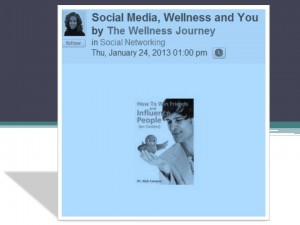Later today I will be interviewed (archived podcast here) on The Wellness Journey with Lynnis Woods-Mullins (@PraiseWorks), and we’ll be discussing the wellness aspect of social media. Wellness and social media? You bet. Social media is simply an extension of our already hard-wired nature to form social groups. The stronger (and for some people bigger) the groups, the more mental and physical advantages one has. There may even be a connection to longevity. Dang! Yes, being social is a part of the human evolution.
Our strongest advantage as a species is our ability to organize and manage large groups. We learned early on that we would be more powerful as one thousand than as simply one or a few, and so we took advantage of our capacity to cooperate and form civilizations. Now cooperation is not a purely human phenomenon, as many animal species do it, but in sheer capacity and sophistication, humans take the cake. We’ve expanded our social organization progressively from the beginning of existence, moving from hunter-gatherer tribes to the internet. Social media is just the next leg of that human social evolution.
Scientist have recently become increasingly interested in the social benefits to health. Several 2008-2009 studies showed promising results:
 A 2008 study of stroke sufferers showed that being able to maintain valued group memberships played as important a role in positive recovery as an ability to overcome cognitive difficulties (e.g., problems with memory and language). After their stroke, people’s life satisfaction increased by 12% for every group membership that they were able to retain.
A 2008 study of stroke sufferers showed that being able to maintain valued group memberships played as important a role in positive recovery as an ability to overcome cognitive difficulties (e.g., problems with memory and language). After their stroke, people’s life satisfaction increased by 12% for every group membership that they were able to retain.- A 2009 study of residents entering a new care home. This showed that those who participated as a group in decisions related to the decoration of communal areas used those areas 57% more over the next month and were far happier as a result. In contrast, the use of space by residents in a control group declined by 60%. Moreover, these differences were still apparent three months later.
- Another 2009 study looked at the impact of group interventions on the health and well-being of 73 people residing in care. After a period of six weeks the researchers found that people who took part in a reminiscence group showed a 12% increase in their memory performance, while those who received individual reminiscence or a control intervention showed no change.
- Another 2009 study also studied nursing home residents and looked at the relationship between their sense of identity and well-being and the severity of their dementia. The study’s key finding was that a strong sense of identity associated with perceived membership of social groups, was a much better predictor of residents’ well-being than their level of dementia.

Professor Jolanda Jetten from the University of Queensland, Australia commented on the findings from these studies: “New research shows just how important groups and social identity are to well-being. This is something that people often overlook in the rush to find medical solutions to problems associated with ageing, but it is time that these factors were taken much more seriously”.
And says Dr Catherine Haslam of the University of Exeter in the U.K.: “On the basis of what is now a very large body of research we would urge the medical community to recognize the key role that participation in group life can play in protecting our mental and physical health. It’s much cheaper than medication, with far fewer side effects, and is also much more enjoyable.”
Other studies that I have reported on in this blog also show the wellness benefits to social interactions. One study (2008) showed that people with large and strong social networks fared better following surgery—in healing time and extent. Another study (2008) showed that our sociability is actually a biological/neurological trait, giving further evidence to its role and interdependence in human evolution.
Another in 2009 which showed that repressed emotions can lead to greater risk of dying from a cardiac event, while a 2010 study showed that having strong social networks and interactions actually decreased death, in general, by 50%.
These studies simply confirm why using social media to remain connected, and thus in wellness, is the wisest practice people can adopt. Social media isn’t just digital narcissism, as some skeptics have defined it. It is real interactions, in real time, with real people (and if you really can’t tell the difference, then you really do need to get out more)—the perfect ingredients to rich social health and wellness. Keep Tweeting.
















